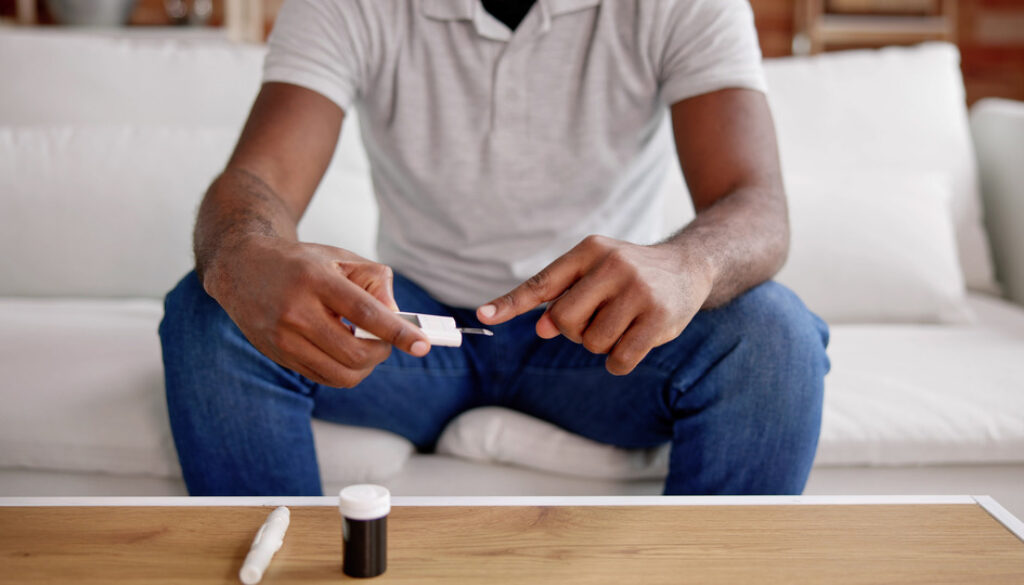Diabetic? Our Comprehensive Guide Will Help Your Blood Sugar Levels Maintenance
Updated June 2023
Diabetes is a chronic condition that affects millions of people around the world. It occurs when the body is unable to properly regulate blood sugar levels, leading to high levels of glucose in the bloodstream. This means that blood sugar level maintenance is vital to stay healthy.
Managing diabetes can be a difficult and ongoing challenge, as several factors can influence blood sugar levels.
For people with diabetes, keeping blood sugar under control is vital for their health and well-being. High blood sugar can lead to a range of complications, including nerve damage, kidney disease, and cardiovascular problems. On the other hand, low blood sugar can cause unconsciousness and other serious problems.
It can be difficult to achieve and maintain that balance.
Our leading internal medicine physicians in Raleigh specialize in the treatment of diabetes. To help you better understand the many factors that influence blood sugar and to assist you in having healthy blood sugar level maintenance, we’ve compiled this useful guide. We’ll review each of these aspects of diabetes in detail to take you one step closer to living the healthiest life possible.
What Should Your Blood Sugar Level Be if You’re Diabetic?
For people with diabetes, managing blood sugar levels is crucial to maintaining overall health and preventing complications. Generally speaking, the target range for healthy blood sugar levels for someone with diabetes is between 70-130 mg/dL before meals and less than 180 mg/dL two hours after starting a meal.
However, it’s important to note that everyone’s blood sugar levels can fluctuate throughout the day and may be affected by factors such as physical activity, stress, and medication dosages.
It’s also important to work with a healthcare provider to determine an individualized target range and to regularly monitor blood sugar levels maintenance through self-monitoring or continuous glucose monitoring.
Tips for Blood Sugar Levels Maintenance
The body uses glucose (sugar) for fuel by using insulin to transform glucose into energy. In type 2 diabetes, the body isn’t able to process glucose because it is first resistant to insulin’s action and then can’t produce enough insulin. As a result, the glucose level increases.
Over time, high blood sugar can lead to serious complications, representing some of the most serious consequences of uncontrolled diabetes, including blindness or limb amputation.
Controlling your blood sugars helps to prevent those complications.
The Importance of Monitoring
First and foremost, you can’t effectively control your blood sugar if you have no idea what it is.
Regular testing is important to understand how your body reacts to your medication and/or diet changes. We are always happy to speak with patients about how often and when they should test their blood glucose levels.
This may vary depending on whether or not you have type 1 or type 2 diabetes. You may want to consider packing healthy snacks or glucose tablets to have on hand in case of a drop in blood sugar. It is important to plan to make timely, healthy decisions.
Keeping Your Blood Sugar Under Control
Here are some helpful tips on how those with diabetes can keep their blood sugar under control:
Establish a regular exercise regimen.
We enjoy helping patients outline exercise and fitness goals because it demonstrates that they want to take an active part in their health care. The frequency and time of day of exercise can have an impact on blood sugar.
Incorporate foods into your diet that have a low glycemic index (GI).
These food provide nutrients such as calcium, potassium, fiber, magnesium, and vitamins A, C, and E.
What are these foods? Dark green, leafy vegetables (such as kale and spinach) that are low in calories and carbohydrates, citrus fruits, nuts, berries, and fish high in omega-3 fatty acids.
Beans are also another healthy consideration—while beans are considered starchy vegetables, they provide a good dose of protein with less saturated fat than meat. Your blood pressure and lipids will have to be monitored regularly. To keep these parameters in strict control per ADA guidelines, you may require medication.
Plan ahead.
This can help you avoid last-minute unhealthy menu choices or meals high in carbohydrates that can cause problems with blood sugar levels. It’s vital for blood sugar levels maintenance.
When traveling, remember that if you are crossing several time zones, your body may need time to adjust to the change.
We encourage our patients to speak with us about their travel plans so we can answer any questions they may have.
Be Prepared When Traveling
Remember that if you are traveling by plane, you may need to have a letter from a physician explaining that you have diabetes, and need to carry testing supplies and insulin (if you use it) on board.
Some countries require visitors to receive specific immunizations, and sometimes these shots can affect blood sugar levels, so we encourage patients to get these shots a month before they travel.
When it comes to keeping blood glucose levels under control, there is no “one-size-fits-all” solution. This is why, as internal medicine physicians in Raleigh, we tailor every healthcare plan to address specific issues—and to help you with blood sugar levels maintenance.
How Often Should Diabetics Check Blood Sugar?
A diagnosis of diabetes is often overwhelming, and patients may have many questions about how to manage this illness.
While there is no cure for diabetes, it can be managed, and a key to successfully managing this disease is blood sugar levels maintenance.
Success and Blood Sugar Levels Maintenance Are More Than Just Numbers
Information from the Diabetes Care Medical Journal indicates that there is more to managing blood sugar than merely how many times a day you test your blood sugar.
Success is determined by how well you comply with the medication and dietary instructions provided by their physicians.
This may mean that you need to test their blood sugar level before exercise, at bedtime, before eating, and when you suspect low blood sugar. It’s also important to test blood sugar before performing important tasks such as driving.
Depending upon your particular situation, this may mean testing blood glucose six to eight times daily.
MULTIFACETED DIABETES TREATMENT
Studies show that patients who test their blood sugar levels maintenance more frequently demonstrate a lower A1C level.
However, among diabetic patients who are not being treated with insulin, routine blood sugar testing appears to be less effective.
The bottom line is that blood glucose monitoring is only one part of diabetes management.
Any information on blood sugar levels should be integrated into clinical and self-management plans.
Real-time clinical glucose monitoring is another useful tool when these sensors are calibrated correctly. These continuous monitors have alarms that notify patients of hypo- and hyperglycemic events.
The bottom line? How often you should check your blood sugar levels depends upon your individual situation, the type of diabetes you have, and your medical history. That’s why, at Raleigh Medical Group, we tailor our plans to fit your individual situation.
Speak to us about when and how often you should check your blood glucose levels.
Can Stress and Anxiety Raise Blood Sugar Levels?
Everyone experiences anxiety. Studies show Americans are more stressed out than ever.
But can stress and anxiety raise the level of your blood sugar? And what does this mean for those who have diabetes?
Is There a Connection Between Stress and Blood Sugar Levels?
Yes, there is. It’s caused by both psychological and physical factors.
We’ll explore these along with some useful tips on how to cope with anxiety and stress.
What Happens in Your Body When You Get Stressed?
Stress hormones have a big role to play.
When you’re experiencing physical or emotional stress, hormones are released that increase your blood sugar. Cortisol and adrenaline are other primary hormones involved.
This is a perfectly natural response. For example, if you’re being chased by a barking dog or you’re in a dangerous situation, you need these hormones to prepare your body for a “fight or flight” situation.
But when you’re stressed, your body releases these hormones, even if there isn’t a major physical threat involved.
The result? Higher blood pressure, increased heart rate, and a rise in blood sugar.
The problem becomes more complicated.
If you’re consistently under stress, your hormones and sugar will continue to surge.
Over time, this can put you at risk for:
- Heart disease
- High blood pressure
- Headaches
- Sleep problems
- Chronic anxiety
- Depression
This is one reason why it’s so important to treat your stress and anxiety.
Taking Care of Yourself When Stressed
When we’re stressed, we typically don’t take good care of ourselves.
There’s a reason they call it “comfort food.” For most people, chocolate or fast food seems to be the first thing they reach for when they’re stressed.
Stress also makes it tempting to put off your regular exercise routine in favor of the couch and a Netflix binge.
These can all become deciding factors in a spike in blood sugar.
Need a solution? Get moving when you’re stressed. Don’t feel like you have to complete an extensive cardio routine. Often something as simple as a walk around the block can make a difference in your mood.
Dealing With Diabetes Can Cause Anxiety
Let’s face it: Controlling diabetes is hard work.
That in itself is enough to cause worry and stress. In fact, according to the Centers for Disease Control, those with diabetes are 20 percent more likely to experience anxiety than those without the disease.
We understand this, and we’re dedicated to helping alleviate your worry by working together as a team to address any distressing issues.
How to Reduce Anxiety
First, let’s be clear: If you’re experiencing anxiety, we want to know about it. We care about much more than your physical health. We know that mental health is an important part of your overall well-being.
Following are some useful tips for reducing anxiety:
- Any type of physical activity, even if it’s just a quick walk around the block during your lunch break.
- Meditation or yoga
- Speaking to a supportive friend, coworker, or clergy.
- Being gentle with yourself—give yourself a break and don’t be so hard on yourself.
- Doing something fun, like engaging in a hobby or reading.
- Eating healthy foods.
- Reducing or eliminating your alcohol and caffeine consumption
- Getting enough sleep
If your anxiety continues for more than two weeks or if you’re finding it difficult to complete everyday activities, you should consider talking to a counselor or psychologist who can provide help and direction. We can provide a referral if needed.
Keep a Close Eye On Your Blood Sugar Levels
It’s always important to keep tabs on your stress and blood sugar. That’s why we recommend a fasting blood sugar test at every yearly physical.This will help us be aware of your blood sugar levels maintenance.
If your blood sugar starts to creep upward, we can be proactive and start measures to help you.
This is particularly important if you have diabetes or prediabetes. If you have these conditions, we may suggest that you have blood sugar screenings more often. We can guide you through when you should check your blood sugar, and our dietitian can help you select healthy meals.
Are Some People More Prone to Anxiety Than Others?
That’s a difficult question, and there’s no one correct answer.
Generally, both physical and psychological factors cause everyone to react to stress differently.
For example, genetics can play a role. Some genes that control the stress response may go into “overdrive” while for other people, they are under reactive.
Those who experience traumatic life events or are survivors of abuse may be more vulnerable to stress.
Still, others may have a combination of factors.
Keeping Your Blood Sugar Levels Maintenance Under Control: Raleigh Medical Group Can Help
This is a team effort.
Don’t feel you have to go it alone.
For decades we’ve been the provider of choice in the Raleigh, Cary, and Triangle areas. Our experienced, compassionate physicians and healthcare team are ready to guide you toward the healthiest life possible.
Get the information you need on blood sugar levels maintenance and gain more helpful tools to help keep your glucose numbers in the healthy range.
Not sure of your numbers? Does diabetes run in your family? Or maybe you’re just overdue for your regular physical. Contact us today for an appointment. We would love the chance to be your medical home.




